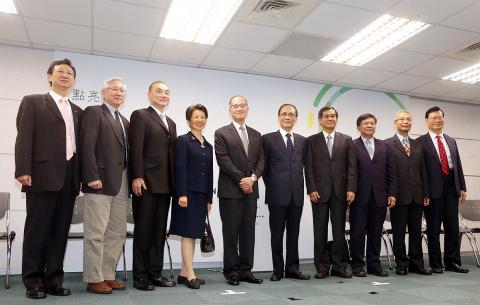Premier-designate Lin Chuan (林全) yesterday filled out his future Cabinet, including three ministers to handle national defense, foreign affairs and cross-strait relations, in preparation for the handover of power on May 20.
David Lee (李大維), a seasoned diplomat who is currently the representative to Australia, is to take over the foreign affairs portfolio, Lin said.
Lee, 66, holds a doctorate in foreign affairs from the University of Virginia. He has also served as the nation’s representative to the US, Canada and the EU.

Photo: CNA
Another experienced diplomat, Katharine Chang (張小月), 63, is to head the Mainland Affairs Council, the top government agency in charge of China policy, Lin said.
Chang is the chairperson of the Coordination Council for North American Affairs under the foreign ministry.
The Ministry of National Defense is to be headed by Feng Shih-kuan (馮世寬), a former air force general and former chairman of Aerospace Industrial Development Corp (AIDC, 漢翔航空工業), Lin said.
Feng recently accompanied president-elect Tsai Ing-wen (蔡英文) on a visit to AIDC, during which she said the company would play a very important role in the country’s national defense industry.
AIDC would focus on the research and development of advanced trainer aircraft, Tsai said.
Feng’s appointment underscores Tsai’s determination to push for the nation’s self-reliance in the production of aircraft and warships.
Tsai also named two new members of her incoming administration, Lin Bih-jaw (林碧炤), who is to serve as the Presidential Office secretary-general, and Democratic Progressive Party Secretary-General Joseph Wu (吳釗燮), who is to take up the post of National Security Council secretary-general.
Lin Bih-jaw, 67, has a doctorate in international politics from the University of Wales.
He has served as vice president of National Chengchi University and deputy secretary-general of the Presidential Office and the National Security Council.
Wu, 61, who holds a doctorate in political science from Ohio State University, is a former representative to the US.

‘WIN-WIN’: The Philippines, and central and eastern European countries are important potential drone cooperation partners, Minister of Foreign Affairs Lin Chia-lung said Minister of Foreign Affairs Lin Chia-lung (林佳龍) in an interview published yesterday confirmed that there are joint ventures between Taiwan and Poland in the drone industry. Lin made the remark in an exclusive interview with the Chinese-language Liberty Times (the Taipei Times’ sister paper). The government-backed Taiwan Excellence Drone International Business Opportunities Alliance and the Polish Chamber of Unmanned Systems on Wednesday last week signed a memorandum of understanding in Poland to develop a “non-China” supply chain for drones and work together on key technologies. Asked if Taiwan prioritized Poland among central and eastern European countries in drone collaboration, Lin

The Chien Feng IV (勁蜂, Mighty Hornet) loitering munition is on track to enter flight tests next month in connection with potential adoption by Taiwanese and US armed forces, a government source said yesterday. The kamikaze drone, which boasts a range of 1,000km, debuted at the Taipei Aerospace and Defense Technology Exhibition in September, the official said on condition of anonymity. The Chungshan Institute of Science and Technology and US-based Kratos Defense jointly developed the platform by leveraging the engine and airframe of the latter’s MQM-178 Firejet target drone, they said. The uncrewed aerial vehicle is designed to utilize an artificial intelligence computer

Renewed border fighting between Thailand and Cambodia showed no signs of abating yesterday, leaving hundreds of thousands of displaced people in both countries living in strained conditions as more flooded into temporary shelters. Reporters on the Thai side of the border heard sounds of outgoing, indirect fire yesterday. About 400,000 people have been evacuated from affected areas in Thailand and about 700 schools closed while fighting was ongoing in four border provinces, said Thai Rear Admiral Surasant Kongsiri, a spokesman for the military. Cambodia evacuated more than 127,000 villagers and closed hundreds of schools, the Thai Ministry of Defense said. Thailand’s military announced that

CABINET APPROVAL: People seeking assisted reproduction must be assessed to determine whether they would be adequate parents, the planned changes say Proposed amendments to the Assisted Reproduction Act (人工生殖法) advanced yesterday by the Executive Yuan would grant married lesbian couples and single women access to legal assisted reproductive services. The proposed revisions are “based on the fundamental principle of respecting women’s reproductive autonomy,” Cabinet spokesperson Michelle Lee (李慧芝) quoted Vice Premier Cheng Li-chiun (鄭麗君), who presided over a Cabinet meeting earlier yesterday, as saying at the briefing. The draft amendment would be submitted to the legislature for review. The Ministry of Health and Welfare, which proposed the amendments, said that experts on children’s rights, gender equality, law and medicine attended cross-disciplinary meetings, adding that